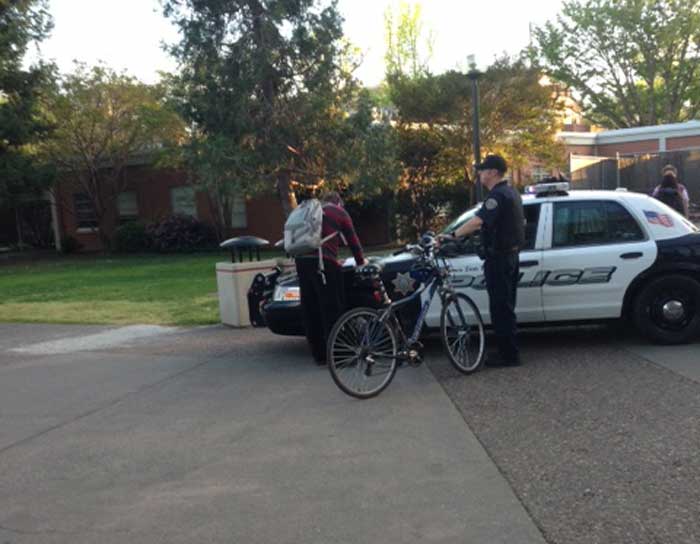
Despite regulations against it, students still continue to ride their bikes and skateboards through campus and with new regulations soon to make their consequences cheaper, it may continue that way.
Current policy states that all riding within the campus core is prohibited. Students who are discovered violating the policy will receive an initial warning and the next time they will be cited, said Robyn Hearne, chief of University Police.
The existing citation rules require that the violator make an appearance in court and pay a fine of up to $200.
For most students, receiving a ticket of that amount can be a burden. Junior prerecording arts major Ian Rene was ticketed last semester and ended up paying about $135 on top of having to show up in court on a Monday, missing his morning classes.
“That’s expensive for a broke college kid,” Rene said. “No one was even on campus.”
A new option is soon being introduced to reduce the punishment on bikers and skaters who are cited for riding bikes or skateboards on campus, said University Police Sgt. Bryce Davison.
Instead of having to appear in court and pay the current fee, students will soon be able to pay a reduced amount of $60, take an online safety course and the citation will be dismissed without the need for a court appearance, Davison said.
The course will include slides on basic state and local laws and then a quiz at the end which should take up to 45 minutes.
The University Police hopes to have the online course available by the end of May, Davison said.
Last month, University Police reported that 24 citations were written. There were also 29 bikers and 15 skateboarders stopped on campus.
The dangers of people riding on campus is a continued worry for campus members, Hearne said.
“Our campus has many concerns for those with disabilities and helping to maintain a safe environment for everyone,” Hearne said. “Bicycles and skateboarders on campus create a dangerous situation for pedestrians.”
As much as the university stresses that absolutely no riding should be occurring within the campus core, students still come across situations where they find people violating the rules.
“I would work out really late some nights and walk back to the dorms with headphones in and jump a freaking mile when a skateboarder, longboarder or whatever would whiz by two inches from me,” said Katie Barraza, a sophomore child development major. “There are signs everywhere not to do that.”
With bike paths on the roads, Barraza said she doesn’t think there are any reasons for bikers and boarders to ride through campus.
But the University Police understand that biking and skating is an important mode of transportation at Chico State, Hearne said, and is always working to find ways to make the process more convenient.
At the beginning of the fall semester, the campus introduced the bike path along the tennis courts and by Yolo Hall. Hearne said this is only phase one in a plan to accommodate bikers traveling to campus.
Michael Arias can be reached at newseditor@theorion.com or @mikey_arias on Twitter.




